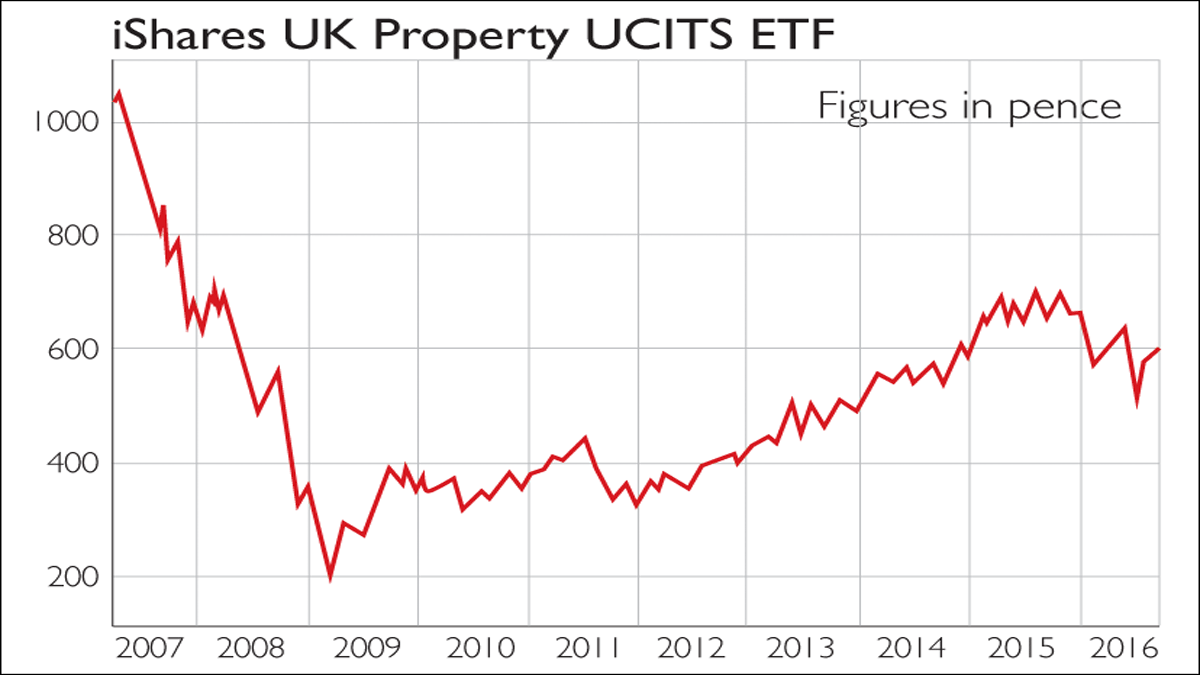Boost your income with derivatives
A few equity income funds are targeting returns in excess of 4% or 5% a year using strategies originally developed in the world of options trading and structured products.

Get the latest financial news, insights and expert analysis from our award-winning MoneyWeek team, to help you understand what really matters when it comes to your finances.
You are now subscribed
Your newsletter sign-up was successful
Want to add more newsletters?

Twice daily
MoneyWeek
Get the latest financial news, insights and expert analysis from our award-winning MoneyWeek team, to help you understand what really matters when it comes to your finances.

Four times a week
Look After My Bills
Sign up to our free money-saving newsletter, filled with the latest news and expert advice to help you find the best tips and deals for managing your bills. Start saving today!
The idea of earning in excess of 4% or even 5% a year is understandably appealing to income investors during this time of record-low interest rates. A small sub-set of equity income funds from asset managers such as Schroders and Fidelity are targeting returns of this magnitude. They use strategies originally developed in the world of options trading and structured products.
Funds such as those in Schroders' Income Maximiser range target an income of 7% a year, while also investing in blue-chip UK equities. The managers behind the UK-focused Schroders Income Maximiser fund invest at least 80% of the fund in shares of UK companies that they see as offering good value. The boost to income comes from a second overlay, using around 20% of the fund.
"Many financial institutions are willing to enter into contracts relating to individual shares whereby they agree to provide an upfront payment in exchange for any rise in the share price above a certain level over a set period of time," explains Schroders in the fund's brochure. These products are known as "covered-call options" and categorised as derivatives. "Our managers sell these option contracts on a recurring basis, typically for three-month periods. The upfront payments from buyers are used to help boost the natural annual dividend by around a further 3.5%." The investor then ends up with a fund yielding around 7%, generated from a concentrated portfolio of 36 stocks.
MoneyWeek
Subscribe to MoneyWeek today and get your first six magazine issues absolutely FREE

Sign up to Money Morning
Don't miss the latest investment and personal finances news, market analysis, plus money-saving tips with our free twice-daily newsletter
Don't miss the latest investment and personal finances news, market analysis, plus money-saving tips with our free twice-daily newsletter
Overall, returns from the Schroders fund have been pedestrian since launch in 2005: the return over five years is 79%, relative to 77% for the benchmark, and 76% versus 71% over ten years. But as long as the fund keeps pace with the main market, and continues to deliver that income, that's all that its investors care about which is why the fund has amassed assets of around £1bn.
Moreover, there's no reason why this strategy can't work for passive equity funds and exchange traded funds (ETFs). Over in the US, for instance, there are seven covered-call ETFs. The biggest of these funds, run by Powershares, has just under $300m in assets and yields 3.14%, much higher than the yield on the main market. The total expense ratios of these ETFs are around 0.75%, which is well below the fees charged by Schroders in the UK.
After a long delay, we now also have a range of UK-listed ETFs which run a covered-call strategy using blue-chip equities. Canadian asset manager BMO has just released three new funds on the London Stock Exchange: Enhanced Income UK Equity (LSE: ZWUK), Enhanced Income Euro Equity (LSE: ZWEU) and Enhanced Income USA Equity (LSE: ZWUS). The headline numbers for the UK fund include a current yield of just under 6% on a total expense ratio of just 0.30%. Half of the UK ETF is invested directly in FTSE 100 stocks, while the other half sells what are called index call options on the FTSE 100. Like covered-call options on individual stocks, these are exchange-traded derivatives that have a typical duration of one to three months, and generate income for the fund.
In sum, these ETFs should provide extra income, tracker-like returns and lower volatility in some markets. Note that covered-call or enhanced-income funds have been tried in the UK market before, and they didn't fare well. That said, as a provider, BMO has a great deal of experience with this sector, so for those investors seeking income, this ETF may prove to be a clever, alternative take on the more traditional core UK equity tracker.
Activist watch
Trian Fund Management's Nelson Peltz's latest tactic is to "play nice", say Anders Melin and Scott Deveau on Bloomberg. As Peltz angles for a seat on Procter & Gamble's (P&G) board, he's pledging to back social, environmental and governance issues in ways that may appeal to its institutional investors. His approach should resonate with BlackRock, State Street and Vanguard Group, which own the three largest publicly disclosed blocks of P&G, and which have each championed holistic corporate governance in recent years. Although highlighting governance weaknesses is a time-tested activist strategy, Trian's peers have not made similar commitments to push responsible causes on their websites.
In the news this week...
A weak US dollar and better-than-expected economic data from China have "reignited" the investment case for mining stocks, says David Thorpe for FTAdviser. Several well-known equity income managers are increasing their investments in the sector. The weak greenback benefits mining companies, as virtually all commodities are priced in dollars, meaning demand from non-dollar economies is likely to go up. Commodity companies are also benefiting from an increase in demand from China. Ed Legget, manager of the £585m Artemis UK Select fund, now has 4% of his fund invested in FTSE 100 commodities group Glencore, while the £3.3bn JO Hambro UK Equity Income fund has invested in miner Anglo American's shares, which offer a forecast 2017 yield of 4.8%.
Shares in the Fundsmith Emerging Equities investment trust are trading at their widest discount (3% as of last Wednesday) since the fund's launch three years ago, says Daniel Grote on Citywire's Investment Trust Insider. It appears that the trust's lagging performance may "finally be catching up with the rating of the shares". The fund has been hit by India's demonetisation programme, and there is "increasing evidence [that Terry] Smith's [generally celebrated] investment process is harder to implement in emerging markets", reports Grote.
Get the latest financial news, insights and expert analysis from our award-winning MoneyWeek team, to help you understand what really matters when it comes to your finances.

David Stevenson has been writing the Financial Times Adventurous Investor column for nearly 15 years and is also a regular columnist for Citywire.
He writes his own widely read Adventurous Investor SubStack newsletter at davidstevenson.substack.com
David has also had a successful career as a media entrepreneur setting up the big European fintech news and event outfit www.altfi.com as well as www.etfstream.com in the asset management space.
Before that, he was a founding partner in the Rocket Science Group, a successful corporate comms business.
David has also written a number of books on investing, funds, ETFs, and stock picking and is currently a non-executive director on a number of stockmarket-listed funds including Gresham House Energy Storage and the Aurora Investment Trust.
In what remains of his spare time he is a presiding justice on the Southampton magistrates bench.
-
 Pitch to Portfolio: Lioness Jill Scott's investing game plan
Pitch to Portfolio: Lioness Jill Scott's investing game planPodcast After bringing football home as a Lioness, Jill Scott discusses how she transformed her finances and became an investor in this latest episode of MoneyWeek Talks.
-
 UK unemployment hits highest level since 2021 – will interest rate cuts follow?
UK unemployment hits highest level since 2021 – will interest rate cuts follow?UK unemployment reached its highest rate in almost five years by the end of 2025. Is AI to blame and will the Bank of England step in with an interest rate cut in March?
-
 Bitcoin 'has become the reserve asset of the internet'
Bitcoin 'has become the reserve asset of the internet'Opinion The cryptocurrency has established itself as the electronic version of gold, says ByteTree’s Charlie Morris
-
 It’s fallen hard – but is now the time to buy Scottish Mortgage Investment Trust?
It’s fallen hard – but is now the time to buy Scottish Mortgage Investment Trust?Tips Shares in the Scottish Mortgage Investment Trust have plunged 45% since the beginning of 2022. We take a look at the trust's performance and discuss what's next for the business.
-
 Is it OK to buy Scottish Mortgage investment trust again?
Is it OK to buy Scottish Mortgage investment trust again?Tips Scottish Mortgage investment was hit hard by the tech-stock crash, and it is still being buffeted by headwinds. Should new investors wait for those to ease before buying in?
-
 Scottish Mortgage Investment Trust update: discount to net asset value narrows
Scottish Mortgage Investment Trust update: discount to net asset value narrowsNews Scottish Mortgage Investment Trust's is still trading at a discount relative to its net asset value – but the discount is narrowing, says Saloni Sardana.
-
 Bank on financial stocks with this investment trust
Bank on financial stocks with this investment trustTips Banks, though not British banks, look set for a strong rebound, making this investment trust worth researching.
-
What's behind the boardroom barney at Pollen Street investment trust?
News A dispute between the manager and the board has broken out at Pollen Street Secured Lending, an online-lending investment trust.
-
 An easy way to buy Reits
An easy way to buy ReitsFeatures Sarah Moore tips one great real-estate investment trust (Reit) to buy for those wanting to invest in property.